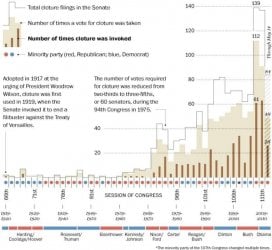Star
Gold Member
- Apr 5, 2009
- 2,532
- 614
- 190
.
Harry Reid Focuses On July For The 'Nuclear Option'
Gabrielle Dunkley
05/17/2013
Senate Majority Leader Harry Reid (D-Nev.) has told top advisers that he is prepared to take action if Senate Republicans block three upcoming nominations, the Washington Post reported on Friday.
Reid is reportedly focusing on the month of July to approach filibuster reform and possibly execute the "nuclear option," which would change the Senate rules and no longer require 60 votes to overcome a filibuster.
<snip>
'bout time Harry!
.
Harry Reid Focuses On July For The 'Nuclear Option'
Gabrielle Dunkley
05/17/2013
Senate Majority Leader Harry Reid (D-Nev.) has told top advisers that he is prepared to take action if Senate Republicans block three upcoming nominations, the Washington Post reported on Friday.
Reid is reportedly focusing on the month of July to approach filibuster reform and possibly execute the "nuclear option," which would change the Senate rules and no longer require 60 votes to overcome a filibuster.
<snip>
'bout time Harry!
.

